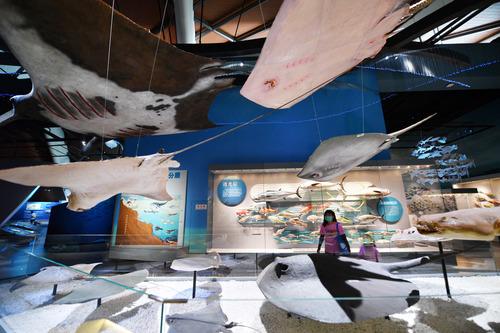BEIJING, July 15 (Xinhua) -- China has seen tourism industry go digital in recent years empowered by 5G, cloud computing, big data, and artificial intelligence.
Such information technology helps solve problems in culture and tourism management, service and marketing with digitalized cultural and tourism products continuously pushing forward online-offline integration of China's tourism industry.
Improved tourism experience
The Ministry of Culture and Tourism has recently released 58 cases that stands out in areas of cultural and tourism informatization development in 2020 with successful digital cultural and tourism products presented as examples to further push industry development and transformation.
Smart platforms such as WeChat mini program launched by the Palace Museum, provincial smart tourism platform "Tour Yunnan" available both via mini program and mobile app by Yunnan province, as well as City Brain mobile app by Hangzhou city of east China's Zhejiang province are on the list, showing how technology transforms the industry and help the industry overcome the blow delivered by the novel coronavirus (COVID-19).
The epidemic has negatively affected cultural and tourism industry but also accelerated and pushed the integration between the sector and science and technology, according to Jin Yuanpu, director of Renmin University's Institute for Cultural Industries, noting that China's cultural and tourism industry is upgrading to a high-tech version in which tourism-related services would be greatly enhanced due to the application of information technology.
In fact, service quality improvement has already been widely felt and welcomed by tourists. "We went to Hangzhou for sight-seeing and arrived at night. The WeChat mini program 'find an available hotel room' by the City Brain system helped us find and locate the hotel very quickly which was such a convenience for us travelers", said Ms Wang, a tourist from Ningbo.
Gansu Culture and Tourism Big Data Exchange and Sharing Platform has realized real-time monitoring and management that tackled previous communication and connection problems. The system covers various data such tourist number, stay duration and tourist distribution which could provide valuable information for Gansu province's tourist industry development, said Yang Yi, a professor with Lanzhou University.
"Dining, accommodation and transportation could all be solved by my phone which is so convenient!" Tang Rui, a tourist to Gansu said.
Science and technology have made a spontaneous travel possible because the integration of online and offline boasts efficiency and convenience, according to Bai Kai, director with tourism department of Shaanxi Normal University, noting that information technology has activated and smoothed previous static tourism information and resources while helped better collect data and made prediction.
Also, the combination of technology and tourism provides helpful insights and solutions into comprehensive management, safety monitoring and segmentation marketing in the cultural and tourism industry, Bai said.
Boosted consumption
The go-digital trend of cultural and tourism industry has nurtured new consumption models thus boosted consumption with more digitalized, internet-based, and smart cultural and tourism resources and products being developed and applied.
This makes "one-stop" cultural and tourism platform also become trendy choice which not only provides tourism information and collect data, but also OK for payment transactions.
The Nanjing cultural consumption smart service platform, for example, hosts more than 200 theatres and performance institutions while integrates with major ticketing service providers to chain up the industry. It so far has sold more than 216 million yuan of tickets and driven related consumption of more than 600 million yuan.
Similar business model could be found in north China's Shanxi province's smart tourism platform, a tourism resource trading platform that integrates existing travel service providers and agents to construct a well-connected network. It sold 387,000 scenic tickets in 2019, generating sales revenue of more than 30 million yuan.
Cultural and creative products were also attached with importance as they boost revenue and are loved by consumers. "Lubo Shouli", a cultural and creative product cloud platform by Shan Dong Museum, combines online shopping, offline smart living exhibition and original product design transformation center to converse museum collections and treasures into popular commodities. The platform so far has gathered more than 200 contracted designers, more than 20,000 intangible cultural inheritors and 300-plus manufacturing companies.
The integration of cultural and tourism with science and technology is "THE" trend for the industry, industry observers say. However, such integration should not be simple model copying and resource stacking, they warn, noting that cultural content should always be at the core of industry development.
No matter what technology you are using, finding own time-honored cultural spirit should always come first for long-term development, observers say. (Edited by Niu Huizhe with Xinhua Silk Road, niuhuizhe@xinhua.org)




 A single purchase
A single purchase









